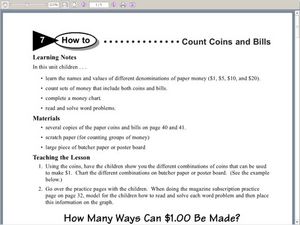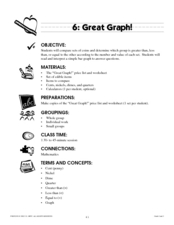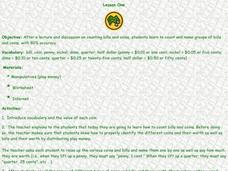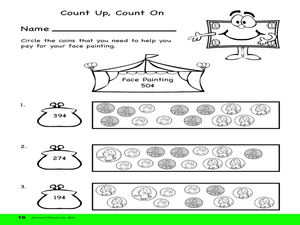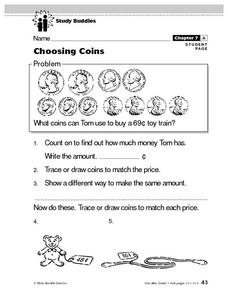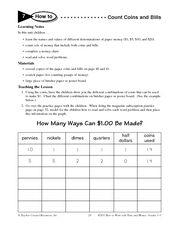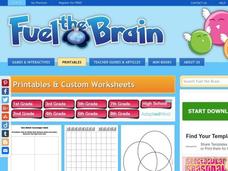Curated OER
Count Coins and Bills
Lower graders recognize coins and paper money and understand its value. They participate in a variety of money problems to appreciate the value of money. Students add, subtract, chart and solve money problems.
Illustrative Mathematics
Money in the Piggy Bank
It's time to crack open that piggy bank and see what's inside. First, count up the pennies, nickels, dimes, and quarters, identifying what fraction of them are dimes. Then calculate the total value of the coins, writing another fraction...
Curated OER
Counting Money and Making Change
Students count collections of coins and one-dollar bills. They solve problems and learn to use the dollar sign ($) with the decimal point to represent money amounts. This lesson is important as a foundation for future math concepts in...
Curated OER
Great Graph!
Here is a fantastic activity counting coins, interpreting graphs, and the concept of "greater than" and "less than." Young mathematicians utilize worksheets embedded in the plan in order to practice these concepts. The worksheets are...
Curated OER
Counting Money
Students learn how to count money. In this money lesson, students review the names and values for each coin. Students learn how to count bills and coins and how to write amounts of money. Students complete web activities including a...
Curated OER
Money Math Carnival
Third graders explore money in a carnival format. In this money lesson, 3rd graders create a carnival of mathematics activities. Students determine the value of money in mixed amounts and explore how to create representations of money.
Curated OER
Smart- Counting Coins
Young scholars discover the name and value of coins. In this counting money lesson, students identify heads and tails of coins and the value of each coin. Young scholars visit websites and play games. Students then write a poem about money.
Curated OER
Show Me The Money
Third graders explore the value of U.S. money. In this money lesson, 3rd graders print out pictures of money from the Internet and create play money. The students will play a game in which they display the amount of money called out by...
Curated OER
Close Observation: Coins
Integrate math, science, and speaking/listening with a collaborative hands-on activity. Each group works with a single penny, examining it with the naked eye and recording observations. Repeat using magnifying glasses. Then repeat with a...
Curated OER
Counting on Coins
Learners count coins. In this currency and mathematics lesson, students use skip counting to figure the value of a group of coins. Learners use plastic replica coins and real coins.
Curated OER
Money
Students practice counting money. In this counting and comparing money instructional activity, students review the value of coins and use play money to count out five dollars. Students complete a worksheet to determine what items they...
Curated OER
Piggy Bank Math
In this math worksheet, students learn to count coins to show a certain amount of money. Students are asked to use an indicated number of coins to total an amount. There are 8 problems. Students make a chart to solve each.
Curated OER
George's Place
Here is another in the interesting series of lessons that uses money as a learning tool. This one is especially clever! During the lesson, pupils pretend they are eating at "George's Place" diner. Small groups are given one bag of play...
Curated OER
Money - Using R & R to Teach Mathematics
Second graders count up coins of money that add up to one dollar. In this money lesson plan, 2nd graders also spend money and keep track of how much they have spent.
Curated OER
Barter vs. Money
First graders listen to the book, Sheep in a Shop, that leads them to think about making financial decisions, trading, and the barter system. After the book is read aloud, a discussion ensues about some of the things that the sheep...
Curated OER
Counting Change and Changing Coins
Second graders demonstrate how to count change. In this consumer math lesson, 2nd graders read the book The Penny Pot and identify the value of coins. Students complete a worksheet to practice counting coins.
Curated OER
Choosing Coins
In this mathematics worksheet, 1st graders identify what coins can be used to buy a toy train. Then they count out how much money is given and write that amount in cents. Students also trace or draw the coins to match each price listed.
Curated OER
Comparing Values: Comparisons Between Musical Notation and Money
Students identify ways in which the principles and subject matter of other disciplines taught in school, specifically math, are interrelated with those of music.
Curated OER
Money
Students count money using only coins. In this money lesson, students read Bennies Pennies, practice counting the pennies in the story and are then introduces to the different coins, penny, nickel, dime and quarter. Students use...
Curated OER
What's All this Money Madness?
Second graders examine the value of money. In this money instructional activity, 2nd graders read the book Money Madness by David A. Alder and watch Brain Pop Jr. videos. Students discuss why we need money and how people earn money....
Curated OER
How To: Count Coins and Bills
Students discover the names and values of different monetary denominations. For this money lesson, students examine the different combinations that money can be added in to find specified amounts. The students complete worksheets based...
Fuel the Brain
Counting Money
If your class understands the value of coins, this worksheet is a great way to assess that knowledge. Students are given an amount of each coin that Mia and Sarah have and will have to determine how much money in total each girl has.
Curated OER
Shopping
Students demonstrate how to count money through a simulated shopping experience. In this consumer math lesson, students read the book Just Shopping With Mom and count play money to illustrate how much the items in the book cost.
Federal Reserve Bank
Bunny Money
Teach your class about saving, spending, and goal setting with a story about a couple of bunnies who went shopping and related activities. Learners keep track of the bunnies' spending, practice identifying long- and short-term savings...


